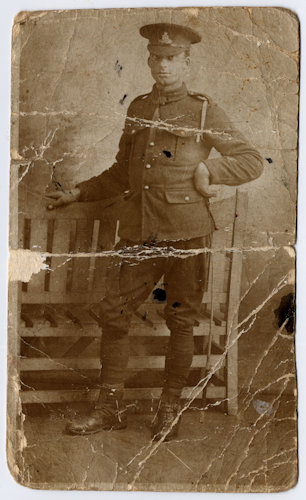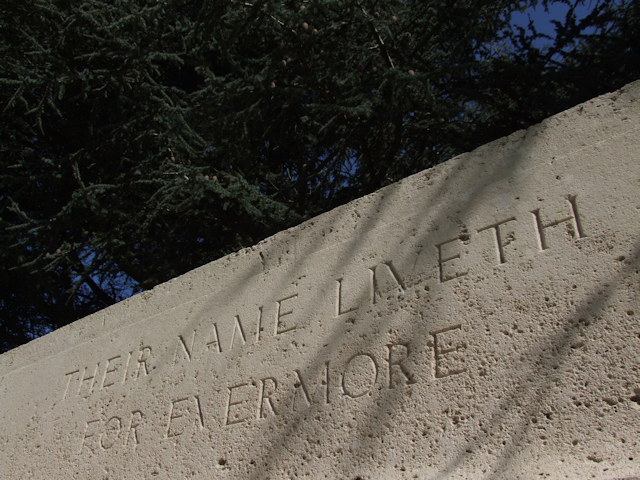Name
Albert, (Bert) Weeden
Conflict
First World War
Date of Death / Age
Rank, Service Number & Service Details
Gunner
77744
Royal Artillery
221st AA (Anti Aircraft) Section
Awards: Service Medals/Honour Awards
Cemetery/Memorial: Name/Reference/Country
Headstone Inscription
Not Researched
UK & Other Memorials
Pirton School Memorial
Biography
Albert appears on the School War Memorial, confirming that he attended the school. Parish records suggest only one man of this name who could have served, and he was born on June 16th 1889 (18th on Church headstone) to William and Hannah Weeden (née Walker). Baptism and census records list ten children but by 1911 two had died. The children were Mary Ann (bapt 1870, d 1870 aged fourteen days), George (bapt 1872), John (bapt 1874, d 1895), Alice (bapt 1878), Mary (b 1880), Ellen (b 1882), William (bapt 1885), Fred (b 1887), Albert (b 1889) and Lily Jane (b 1893). His brother Fred may also have served and his nephew, Leonard, served and survived.
In 1911 Albert was twenty-one, still living in the family home and earning a living as a horseman on a local farm. In 1915 he was recorded as a farmer, but having heard the call to arms aged twenty-five he signed his attestation papers on January 5th 1915, joining the Royal Horse Artillery as Driver 77744 and being sent for training at Woolwich. In early May 1915 he was posted to the Mediterranean Expeditionary Force and joined the 29th Division. As part of “P” Battery, they embarked on the S.S. Orsova from Devonport on May 10th, arriving in the Dardanelles later that month. He had a fearsome welcome, arriving during shelling by the Turks. A report in the North Herts Mail of July 15th 1915 records a letter that he managed to write home shortly afterwards. It provided news and some reassurance for his parents; ‘Just a line to let you know that I am still in the ‘pink’. We landed here Wednesday night receiving a hearty welcome from the Terrible Turks, who were showing us A1, all the lot of them falling in the water. We had a fine journey, travelling second class. We called at Alexandria and stayed there two days but would not let us get off, and the niggers*1 would not let us do any fatigues. I am writing this with the shells pinging over me about every five minutes so you can guess I am not far from the firing-line. We have plenty to eat and drink, and me and my pal have a nice little house which we dug ourselves, about six feet in the ground, so we lay and count stars at night. We lost scarcely any men, only a few horses have dropped since I have been here so I don’t think we shall be here long. The Old Turk will never stand the pepper he is getting. We are getting served out with tobacco tomorrow so will you send some packets of fag papers? It is no use thinking of buying anything here as there are no houses, much less any shops, and writing paper is hard to get. We have no time for writing, what with digging holes for horses and gun-pits. We have just had an argument about when was Whit-Sunday. Some say it was last Sunday. If so this is Friday.'
On the 26th, he was posted ‘in the field’ to “Y” Battery. He did not have a good time and on June 30th was admitted to Hospital with Enteric Fever, a tropical infection. Enteric fevers include typhoid and paratyphoid fevers and gastroenteritis. A week later the hospital in Mudros recorded him as ‘Dangerously ill’ and wired the news. The above newspaper report mentions that he was in hospital through illness and reported that his parents had been ‘wired’ from the Royal Dock Yard Woolwich, informing them that their son Driver Albert Weeden, “Y” Battery Royal Horse Artillery, had become dangerously ill on July 8th but gave no further particulars. Obviously, his parents would have been dreadfully worried, but his health improved and, on the 21st, the hospital wired to say that he had been removed from the danger list. He was invalided from Mudros to England and was admitted to the Military Hospital in Lewisham on September 15th 1915.
Albert’s service record is faded and therefore parts are hard to read but, after recuperation, he certainly remained on home service, stationed at Woolwich, joining “G“ Battery until June 29th 1916 when he embarked for France and, a short time later, joined the 19th Anti Aircraft Battery (AAB). While he remained in France, on October 12th 1916 Albert’s mother died. In December his AAB was reorganised and became “T” Battery AAB. On January 5th 1917 he was granted class II proficiency and was also awarded a Good Conduct Badge. Albert continued his service with a posting to “R” Battery AAB and then, on January 4th 1918, to “U” Battery AAB. He became ill again and on April 20th 1918 was admitted to hospital with mild ‘Inf Accessory Sinuses’. It was presumably not that mild, as he was not discharged until May 4th and then, not back to service, but to the St. Martin Rest Camp. He returned to active service on the 18th and posted to “G” AA B on June 22nd.
The Hertfordshire Express of October 26th 1918 confirmed some of the detail above and added that Albert had been a smallholder in Pirton, that he had been in the army for three years, was serving in France and that, on October 5th, he was wounded. His service records are badly faded at the entry for this date, but they confirm that he was wounded in action, on or just before this date, and that he was admitted to hospital. He was then discharged on the 8th or possibly the 9th.
Rodney Marshall, Albert’s grandson, confirms that Gunner Albert 77744 was in the artillery and was at Gallipoli and also in France. Like most of the men who served, Albert rarely spoke about it. The only things that Rodney remembers him saying were, in reference to Gallipoli, that he was staggered by the ‘sheer number of bodies of men and horses he saw floating in the sea,’ and that when he was billeted in France, ‘the serjeant used to come round early every morning and yell ‘gas’, at which everyone would jump out of bed and don their masks, there was never any gas.’ ‘So one morning my Grandfather and his mate decided to stay in bed;’ ‘that’s how I lost all my teeth’. Rodney adds, “Whether this is true or not who can tell, but he never had any teeth that I remember.”
The 1918 Absent Voters’ List confirms Albert as Gunner 77744, 221st AA (Anti Aircraft) Section, Royal Artillery, with his home address as Dead Horse Lane (now Royal Oak Lane).
In 1921 he married Ruby Goodwin Gaff, who came from Ipswich, in St. Marylebone, London. They had three children Denise (b 1921, Rodney’s mother), who married John Marshall, Ronald (b 1924), who married Patricia Wooley (buried Pirton churchyard) and Ruby (b 1927), who married Rex Allingham from Barton. Both Ron and Ruby, together with their families, emigrated to Australia in the early 1960s.
After the war, in various censuses, he is recorded as a farmer at Hammonds Farm (Burge End Lane). He was also Vice-President of the Pirton branch of the British Legion. Albert and his wife spent the rest of their lives in Pirton and are buried in St. Mary’s churchyard. Albert died in 1958 aged sixty-eight and Ruby in 1971 aged seventy-eight.
*1 We have no wish to offend, this is a direct quote. Remember acceptable word usage was different 95 years ago.
Additional Information
Text from the book ‘The Pride of Pirton’ by Jonty Wild, Tony French & Chris Ryan used with author's permission
Acknowledgments
Text from the book ‘The Pride of Pirton’ by Jonty Wild, Tony French & Chris Ryan used with author's permission, Rodney Marshall (grandson)



